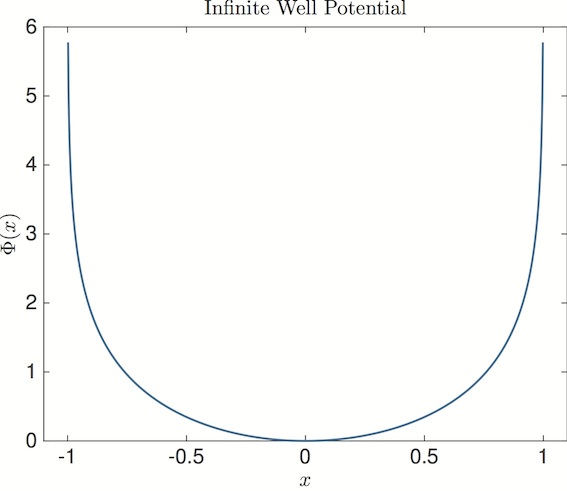Are there any example of SDEs with constant diffusion terms, other than the Ornstein Uhlenbeck process, which have exact solutions? I'm thinking of something of the form: \begin{equation} dX_t = f(X_t)dt + a dW_t \end{equation} where $a$ is a constant, and $f$ is some function.
2 Answers
Yes. Unexpected weak solutions to the SDE $$ d Y = - \Phi'(Y) dt + \sqrt{2} dW \quad Y(0) \in \mathbb{R} $$ are available. To see this, transform the associated Fokker-Planck equation into a Schrödinger equation following e.g. Chapter 5 of H. Risken, The Fokker-Planck Equation, Springer-Verlag, 1989. Loosely speaking, if the resulting Schrödinger equation is solvable, then so is the Fokker-Planck equation for the SDE.
For example, in this way one can obtain a formula for the transition probabilities of a Brownian particle in the infinite well potential shown in the figure.
 .
.
For an animation of the transition probability density of the solution click here. The movie starts at a point mass initial condition at $x=0.125$, and evolves the transition density of the process over a time interval that is long enough for the process to relax to its stationary density. For a MATLAB function file which implements this solution click here.
Finally, here is an explicit formula for the transition density of this weak SDE solution: let $p_t(x,y)$ denote the transition probability density of $Y(t)$ given that $Y(0) = x$, i.e., $$ \int_A p_t(x,y) dy = \mathbb{P} ( Y(t) \in A \mid Y(0) = x ) $$ The formula the code uses is taken directly from Risken, and is given by: $$ p_t(x,y) = e^{\Phi(x)/2 - \Phi(y)/2} \sum_{n=0}^{\infty} \psi_n(x) \psi_n(y) e^{-\lambda_n t} $$ where I respectively introduced a potential: $$ \Phi(x) = - 2 \log( \cos(\pi x/2) ) $$ eigenfunctions $$ \psi_n(x) = \begin{cases} \cos((n+1/2) \pi x) & \text{if $n$ is even} \\ \cos(n \pi x) & \text{if $n$ is odd} \end{cases} $$ and corresponding eigenvalues $$ \lambda_n = \begin{cases} \pi^2 (n^2 + n) & \text{if $n$ is even} \\ \pi^2 (n^2-1/4) & \text{if $n$ is odd} \end{cases} $$ I verified this solution numerically using the numerical PDE-based, SDE solver described in Bou-Rabee and Vanden-Eijnden 2015.
Check the seminar book: Numerical Solution of Stochastic Differential Equations P.Kloeden.
